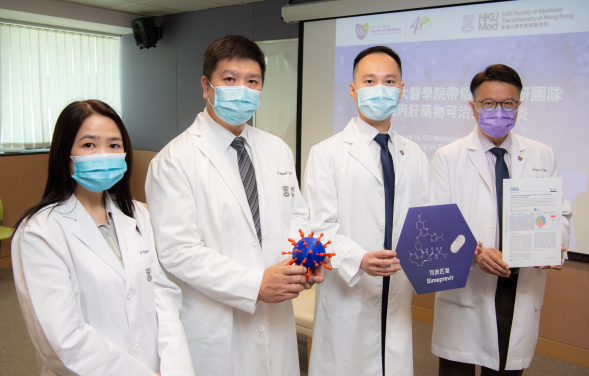Media
A Global Study Led by CU Medicine and HKUMed Discovers
a Hepatitis C Virus Drug as Potent Treatment for COVID-19
10 May 2021

A recent global study led by researchers from the Faculty of Medicine at The Chinese University of Hong Kong (CU Medicine) and the LKS Faculty of Medicine at The University of Hong Kong (HKUMed) has discovered a hepatitis C virus drug “simeprevir” as a potent treatment for COVID-19. From right: Professor David Hui Shu-cheong, Stanley Ho Professor of Respiratory Medicine, CU Medicine; Professor Billy Ng Wai-lung, Assistant Professor, School of Pharmacy, CU Medicine; Dr Michael Chan Chi-wai, Associate Professor, School of Public Health, HKUMed and Dr Kenrie Hui Pui-yan, Research Assistant Professor, School of Public Health, HKUMed.
A recent global study led by researchers from the Faculty of Medicine at The Chinese University of Hong Kong (CU Medicine) and the LKS Faculty of Medicine at The University of Hong Kong (HKUMed) has discovered a hepatitis C virus drug “simeprevir” as a potent treatment for COVID-19, which can strongly suppress the replication of SARS-CoV-2. The combination of this drug with remdesivir can result in drug synergism and generate an even more effective outcome. Simeprevir is by now the only antiviral drug that can target more than one SARS-CoV-2 protein, meaning it can still function even if one of the proteins becomes mutated. The drug has great therapeutic potential and with less chance to develop drug-resistant mutants. The results from this cellular model study have been published in a leading international chemistry journal ACS Central Science. [link to the publication]
Simeprevir targets two SARS-CoV-2 proteins
Since the beginning of 2020, Professor Billy Ng Wai-lung from CU Medicine and Dr Michael Chan Chi-wai from HKUMed have collaborated with over 30 scientists from local and overseas laboratories (including the Mainland, the U.S., France, Germany, South Korea and Taiwan) to search for an effective drug molecule for the treatment of COVID-19. Using a combination of biochemistry, cell biology and computational chemistry techniques, the team tested a number of antiviral drugs approved by the U.S. Food and Drug Administration (FDA) in a cellular infection model. They discovered simeprevir can simultaneously target two major viral proteins that are critical to viral replication, which are main protease Mpro and RNA polymerase. Simeprevir is by now the only antiviral drug that can target more than one SARS-CoV-2 protein.
Professor Billy Ng Wai-lung, Assistant Professor of the School of Pharmacy at CU Medicine elaborated, “Simeprevir is an antiviral agent used for the treatment of hepatitis C by inhibiting the activity of viral protease so as to suppress viral replication. Though the drug has already been replaced by other treatment methods for hepatitis C patients, repurposing existing FDA-approved therapeutic agents can shorten the time frame for clinical trials and may reveal new drug targets that can be further exploited. This is indeed a very promising and encouraging discovery. Besides, the chance that the virus develops simultaneous mutations on both of the two viral proteins main protease Mpro and RNA polymerase is low, thus there is less chance to develop drug-resistant mutants.”
Drug combination enhances therapeutic potential
While remdesivir is effective, it only targets one major viral protein, meaning that remdesivir-resistant viral mutants may emerge. The drug also suffers from drawbacks such as low efficacy against severely ill patients.
Dr Michael Chan Chi-wai, Associate Professor of the School of Public Health from HKUMed said, “We evaluated the antiviral effect of simeprevir together with remdesivir, and were delighted to observe drug synergism. The viral infection experiments performed at the P3 laboratory in HKUMed demonstrated that with 3.3 uM of remdesivir and simeprevir, the antiviral effect was increased over 100-fold when compared with remdesivir alone.”
Professor Ng added, “This not only implies a larger therapeutic window for simeprevir, but also provides mechanistic insights into the interplay between the drugs, giving rise to additional pathways into fighting the virus. Science has no borders. This highly collaborative and interdisciplinary project has shown that the team spirit, determination, and persistence of the researchers are keys to important scientific discovery.”
Professor David Hui Shu-cheong, Stanley Ho Professor of Respiratory Medicine at CU Medicine said, “With the development of new vaccines around the world, there seems to be light at the end of the tunnel for the global COVID-19 pandemic. However, the virus remains rampant, with high infection rates in many countries. Recent research studies suggest that the existing vaccines and drugs may not be able to combat the emerging mutants of the virus effectively. Moreover, the recurring coronavirus epidemics in the last two decades suggest that the virus may become a persistent healthcare issue threatening global health. It is therefore essential to enlarge our therapeutic box in preparation for future coronavirus pandemics.”
Media enquiries
Please contact LKS Faculty of Medicine of The University of Hong Kong by email (medmedia@hku.hk).
